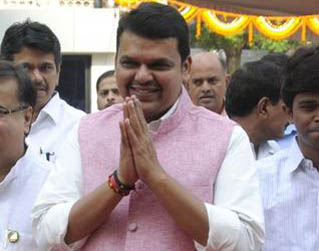Mumbai, Nov 12: The 13-day-old BJP government in Maharashtra today won the trust vote in the Assembly but the passage of the confidence motion triggered a huge controversy with Shiv Sena and Congress contesting the procedure and claiming it had failed to prove majority.
Calling the development a "black day" in the history of the state, the two opposition parties announced that they would register their protest with Governor C Vidyasagar Rao.
 Earlier, BJP MLA Ashish Shelar moved a one-line motion seeking confidence of the House in the Devendra Fadnavis-led government, which was put to a voice vote by Speaker Haribhau Bagde.
Earlier, BJP MLA Ashish Shelar moved a one-line motion seeking confidence of the House in the Devendra Fadnavis-led government, which was put to a voice vote by Speaker Haribhau Bagde.
As the legislators supporting the motion exclaimed "Aye", the Speaker declared it passed, triggering a storm of protest among Shiv Sena and Congress MLAs, who rushed to the Well of the House. Sena earlier in the day formally decided to occupy the main Opposition's space in the Assembly.
"The motion has been passed," Bagde was heard saying over the din. Agitated MLAs of Shiv Sena and Congress were seen arguing with the Speaker even as the decibel level rose steadily, forcing him to adjourn the proceedings.
During the proceedings, members of NCP, which had offered outside support to the BJP government, remained quietly seated.
Sena had earlier staked its claim to the Leader of Opposition's position and the Speaker had said he would take up its demand after the trust vote as Congress too had demanded the post on the grounds that Sena continues to be a constituent of the BJP-led NDA.
As proceedings resumed, the Speaker announced appointment of Sena Legislature Party leader Eknath Shinde as the Leader of the Opposition in the House.
Led by Shinde, Sena MLAs again took up their protest and called for the confidence motion to be determined by a division of votes.
BJP has 121 MLAs and, together with NCP's 41, has the support of 162 MLAs, 18 more than required for a majority in the House which has an effective strength of 287. The party has also claimed the support of seven Independents, three of Bahujan Vikas Aaghadi and some others from smaller parties.
Earlier in the day, BJP's Bagde was elected as the Speaker after Vijay Auti and Varsha Gaikwad, the Sena and Congress nominees, respectively, withdrew from the race, sending signals that the trust vote would go through unhindered with the government easily proving its majority with NCP's help.
Unhappy with the confidence motion passed through voice vote, the Sena MLAs said it amounted to "strangling democracy".
"The House should be run as per rules and the Constitution should not be trampled upon. The new government is strangulating democracy. We sought division but the trust motion was passed by voice vote," Shinde said.
Rejecting his contention, however, the Speaker said, "The issue is over. The trust vote has been passed."
Fadnavis, joining issue with Shinde, said, "Although there is the word opposition in your designation, the expectation is that you should not oppose each and every issue and support the government's pro-people decisions."
Meanwhile, strongly deprecating the passage of confidence motion by a voice vote, former Chief Minister Prithviraj Chavan said it was "unprecedented" in democratic history and demanded that the government seek a division of votes to prove its majority.
"It is a black day for democratic process in Maharashtra. Never has a confidence motion been passed by voice vote. Until the government proves its majority in the House by division, the government is illegitimate," he told reporters outside the Assembly.
State Congress president Manikrao Thakre held that the motion had "not been passed" as there was no division of votes.
"Being a minority government, it was the duty of the government to pass the motion through division. They are around 25 MLAs short (of majority). The Atal Bihari Vajpayee government fell by one vote in Parliament.
"We will frustrate all attempts to manipulate a majority and not allow the Assembly to conduct any business until the government obtains a fresh trust vote," Thakre said, adding that the party's MLAs will call on the Governor to lodge a formal protest over the issue.
Further, claiming that the Fadnavis government had manipulated the trust vote as it did not enjoy majority in the House, Shiv Sena leader Ramdas Kadam said, "Vidhan Sabha stands tarnished today.
"A division would have made it clear whether they have the support of the majority of MLAs. The confidence motion has not been passed."
Raising questions about the conduct of the Speaker, Kadam said he would speak to leaders of all non-BJP parties, including NCP, whether a no-confidence motion should be brought against him.
"People of Maharashtra will not forgive the BJP government for what they have done," he said, adding that the party would take legal recourse in the matter.





Comments
Add new comment